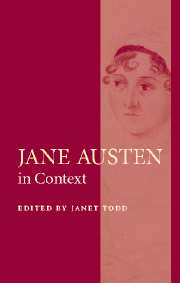27 - Manners
Published online by Cambridge University Press: 19 December 2020
Summary
Manners are key indicators of human behaviour in society. They can reveal social status and its vicissitudes – a matter of great interest in Austen's age, which was a time of rapid social mobility. ‘Nothing has been longer observed,’ wrote Samuel Johnson in essay 172 of The Rambler, ‘than that a change of fortune causes a change of manners.’ An 1807 lecture by Samuel Taylor Coleridge is the earliest recorded instance of the term ‘manners-painter’: the word was used with regard to Chaucer, but it could as well have been applied to Jane Austen as a portraitist of her own social world.
The word ‘manners’ had a variety of meanings in the late eighteenth century, ranging from ‘character of mind’ and ‘general way of life; morals; habits’ to ‘ceremonious behaviour; studied civility’.1 Austen's novels were written on this spectrum: she was always interested in ‘character of mind’; she anatomised the ‘general way of life’, the morals and habits, of the English middling classes of her time; and she was exasperated by – and made comic capital out of – excessively ceremonious behaviour and over-studied civility.
The idea that novels as opposed to didactic moral treatises were a means to paint ‘manners and morals’ – a common pairing of terms – was relatively new and seriously controversial. The epistolary novel, which was formative of Austen's early art, emerged out of the genre of the conduct book through the agency of Samuel Richardson in the mid eighteenth century. Young women of middling class – newly literate, newly articulate – were the primary intended readers of both genres (though Henry Tilney in Northanger Abbey reminds Catherine that men too may enjoy and learn from novels).
Conduct books were considered to be the appropriate reading material for young women. Usually written by men, often clergy, they were repositories of moral and social advice. They represented a significant shift from the aristocratic ideals of civility and gallantry exemplified in earlier courtesy literature. Lord Chesterfield's Letters to His Son (1774), often considered the last courtesy book, was famously described by Dr Johnson as teaching the morals of a whore and the manners of a dancing master.
- Type
- Chapter
- Information
- Jane Austen in Context , pp. 297 - 305Publisher: Cambridge University PressPrint publication year: 2005
- 1
- Cited by



